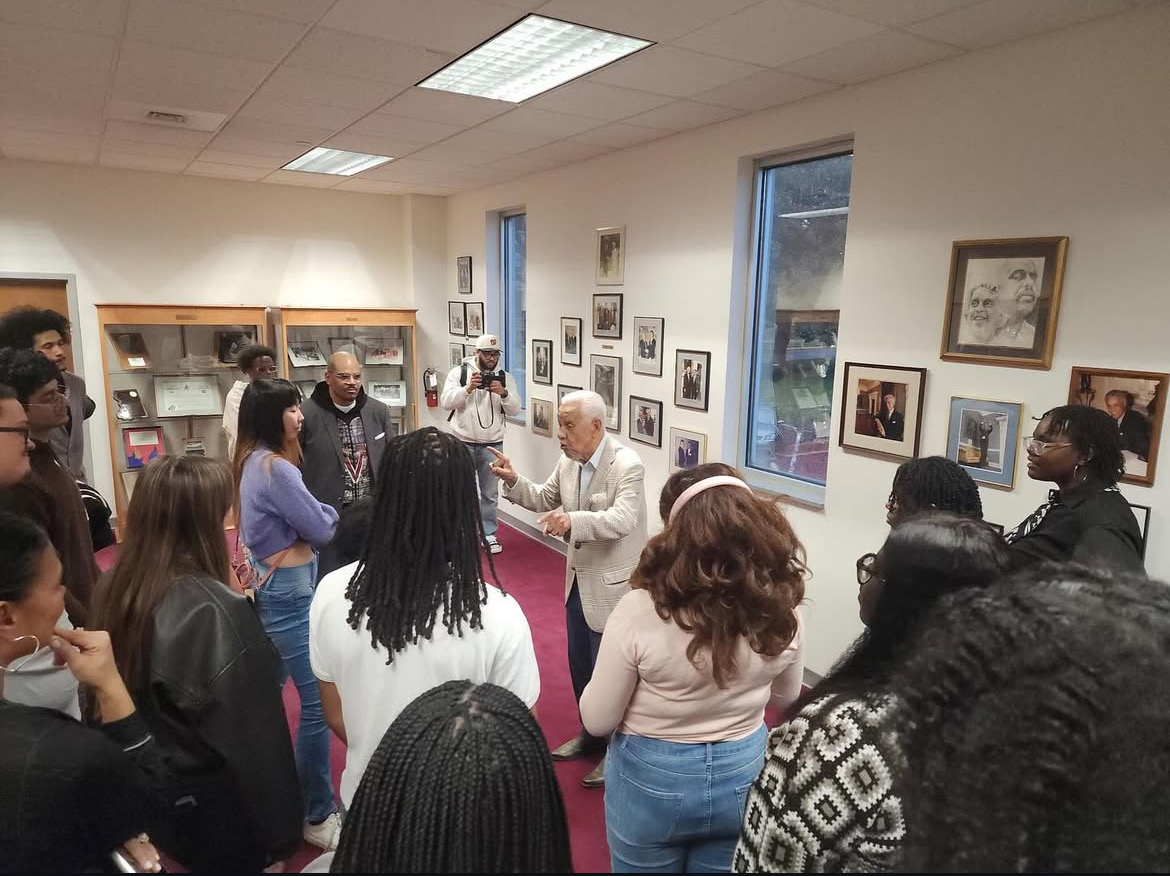On Wednesday May 8, students, faculty, staff and community members filled the Weitz Atrium to witness student and faculty performers share poems in languages other than English, especially those that have some significance to them. In total, there were 25 poem performances in 16 languages, recited by 41 performers, including Victoria Thorstensson’s RUSS 103: Elementary Russian class. Two students read poems that they wrote themselves, and 18 of the readers were first-year students.
Poetry Without Borders began in 2016 at Carleton, but the concept was born at California State University – Long Beach. The founder, Dr. Lauren Brooks shared it with Dr. Juliane Schicker, an associate professor of German at Carleton, who brought it to campus. Poetry Without Borders serves as a forum for the Carleton community and beyond to share their diverse backgrounds, interests and passions with their peers. This year’s event was organized and sponsored by the Carleton College Language Center, the Humanities Center, the Center for Global and Regional studies, as well as the Spanish department, the Department of French and Francophone Studies and the Department of German and Russian.
The event began with an introduction by Amy Hutchinson, the Director of the Language Center. After thanking the sponsors and planning committee, Hutchinson spoke to the immense value of Poetry Without Borders and other events like it. Listening to poetry and writing in other languages “allows us to understand the great impact words can have regardless of the language they are spoken in,” Hutchinson said. While it was expected that listeners would not be able to understand all of the poems that they were about to hear, they were encouraged to simply sit and listen, appreciating the beauty of the reading itself and commending the bravery of its reader. “Let us continue to be a community that appreciates and values its diversity”, Hutchinson said as she concluded her opening remarks.
The first poem, called “Etlekhe Verter Oyf Mame-Loshn” by Irena Klepfisz was performed by Eliza Lox ’25. As Lox explained, the poem consisted of Yiddish phrases with interpretive translations in English.
Edward Hayward ’25 read the poem, “If Life Disturbs You” in Russian and then translated into Chinese. This was Hayward’s last Poetry Without Borders, and he shared that the first time he participated in the event, he couldn’t speak a word in either language. He thanked his professors for helping him come so far, saying, “I owe the many joys of life that come with knowing these two languages to you.”
Hector Melo, an Assistant Professor of Spanish, read two poems in Spanish. The first was titled “Inflation” by Nicanor Parra, and the second, which was originally written in Greek by Kiki Dimoula, was called “The Brazen Plagiarist”.
The next poem was the only poem of the evening read in Louisiana French by Ashton Macklin ’27. He explained that the piece, “Homage to the Poet: For My Friend Dr. J. Chaumette” by Henry Louis Rey, has a lot of connection to Afro-Creole literature.
“The Contrarian” by Janos Endrody was performed in a call and response fashion in Hungarian by Andras Galambos ’24 and Eva Posfay, the chair of the French and Francophone Studies department.
Jyothi Nellakra ’25 performed an original poem in Malayalam called “Coloniser Tongues.” She wrote the piece during winter term and it was about being trans, moving to a new country and struggling with language. The poem was entirely in Malayalam except for the phrase “Transness, Nonbinarity, Gender Incongruency”, which were read in English.
The next poem, titled “Hope” by Lesja Ukrajinka was read by Ostap Hrebeniuk ’27 in Ukrainian then again in French. Hrebeniuk told the story of this poem, which he said was about “an infinite connection to your home.” He explained that when Ukraine was invaded an actress recited the poem in French at a conference, which led to the popularity of its French translation.
Rocio Arami Avila ’26 performed next, reciting “I am the Wind” by Ida Talavera in Guarani. Guarani is a native Paraguayan language, and Avila wanted to share the poem in Guarani rather than just Spanish to share her culture and raise awareness for languages other than Spanish spoken in Latin American countries.
The next poem was described by its reader, Defne Arat ’27 as the most famous poem ever written in the Turkish language, “I am Listening to Istanbul” By Orhan Veli Kanik. Victoria Thorstensson, a Lecturer in Russian read a poem in Russian called “Having Walked Somehow Through This Mortal Life” by Vitaly Pukhanov. This was a poem written by a Russian poet who contemplated if poetry could even be written after the invasion of Ukraine.
Three first-year students, Asia Mikluszka, Iza Mikluszka and Julia Dzeikan read a Polish poem called “Oxygen” by Julia Fiedorczuk with Helena Kaufman, Director of Off-Campus Studies.
Sophie Kuliyeva ’27 then read a Russian poem called “Lily and Lisa are Afraid to Love” by Alexandr Pushkin. After that, four students, Caleb Wataoka ’24, Lucas Schattenmann ’26, Ayana Sakamoto ’26 and Kamalani Aipa ’26, along with Miaki Habuka, an instructor in Japanese, performed the Japanese poem “Be Not Defeated by the Rain” by Kenji Miyazawa.
Next, the French poem, “Our Hands in the Garden” was read by Ella Weigman ’26. This poem was followed by “Summer Song” in Qazaq by Abai Qunanbaiuly, read by Russian Language Associate Darina Kozhakhmetova. She described the piece as “the poem” of Kazakhstan.
Instructor in Spanish Claudia Lange read next, performing two poems in Spanish by Circe Maia, called “The Bridge” and “The Words.” The poet had a personal connection to Lange, as they are from the same town. Next, Lexi Wallace ’26 read “Your Love is Not What I Request” in Russian by Anna Akhmatova. Seth Peabody, Assistant Professor of German went next, reading German poem “The Fisherman” by Johann Wolfgang von Goethe.
Sunny (Shiqi) Sun ’26 read an 11th-century Chinese poem called “Song of Incense” by Qin Guan. She explained how the poem depicted a spring scene in a rural village 1000 years ago. The next poem was performed as a song by Vera Coleman, Spanish Language Program Director. The poem, “Memories of Ypacarai” by Zulema de Mirkin was originally written in Guarani, and while Coleman does not speak Guarani, she sang the last verse in the language after singing the rest of the poem in Spanish.
The final poem was performed by all of Thorstensson’s RUSS 103 class, which consisted of Charlie Rhodes, Valin Vance, Jade Deng, Anya Steigbigel, Bryn Ashland, Danica Dougan, Austin Flamm, Khava Gillespie, Annika McBride, Kat Smiricinschi, Xi Wang and Sophie Kuliyeva, as well as Thorstenssona and Kozhakmetova. The poem, “Has it Been Ever Seen?” by Samuil Marshak was recited in Russian in unison by the students.
Overall, Poetry Without Borders grew in its engagement and was an enjoyable experience for those present. “About a week ago, I decided to attend the Poetry without Borders event because I knew a few of the students and faculty members who were reciting a piece or pieces, and it was really fun to hear them read poetry in languages that were personally meaningful to them. I’ve spent a lot of time throughout this year reading poetry in my Spanish and Latin classes, but the focus there was always on understanding the language enough to translate the work into English,” said Zoe Roettger ’27. “So, I found this event to be quite special in that the emphasis was on simply absorbing the poetry in their original language, (though some were occasionally translated into others), and appreciating them outside of an more academic or English-centric sense, which was an opportunity that I am really grateful to the Language Center for hosting.”
Language Center staff felt positively about the event as well, and are hoping to see Poetry Without Borders grow even more in the future. “It’s events like Poetry Without Borders that really make the Carleton community really remarkable. It is a joy to have an opportunity to get together every year and celebrate the diversity of languages spoken and taught here,” said Hutchinson. “I’m so grateful to each of our performers for having the courage to share a part of their identity with us this evening. Their ability to convey the power and beauty of a poem in a language likely not known to most of the audience is so special and I’m already looking forward to what they are preparing for next year’s event.”
All names of poems are attributed with the English translation of their titles.
Kofsky works as a Language Center Assistant in the Language Center.













